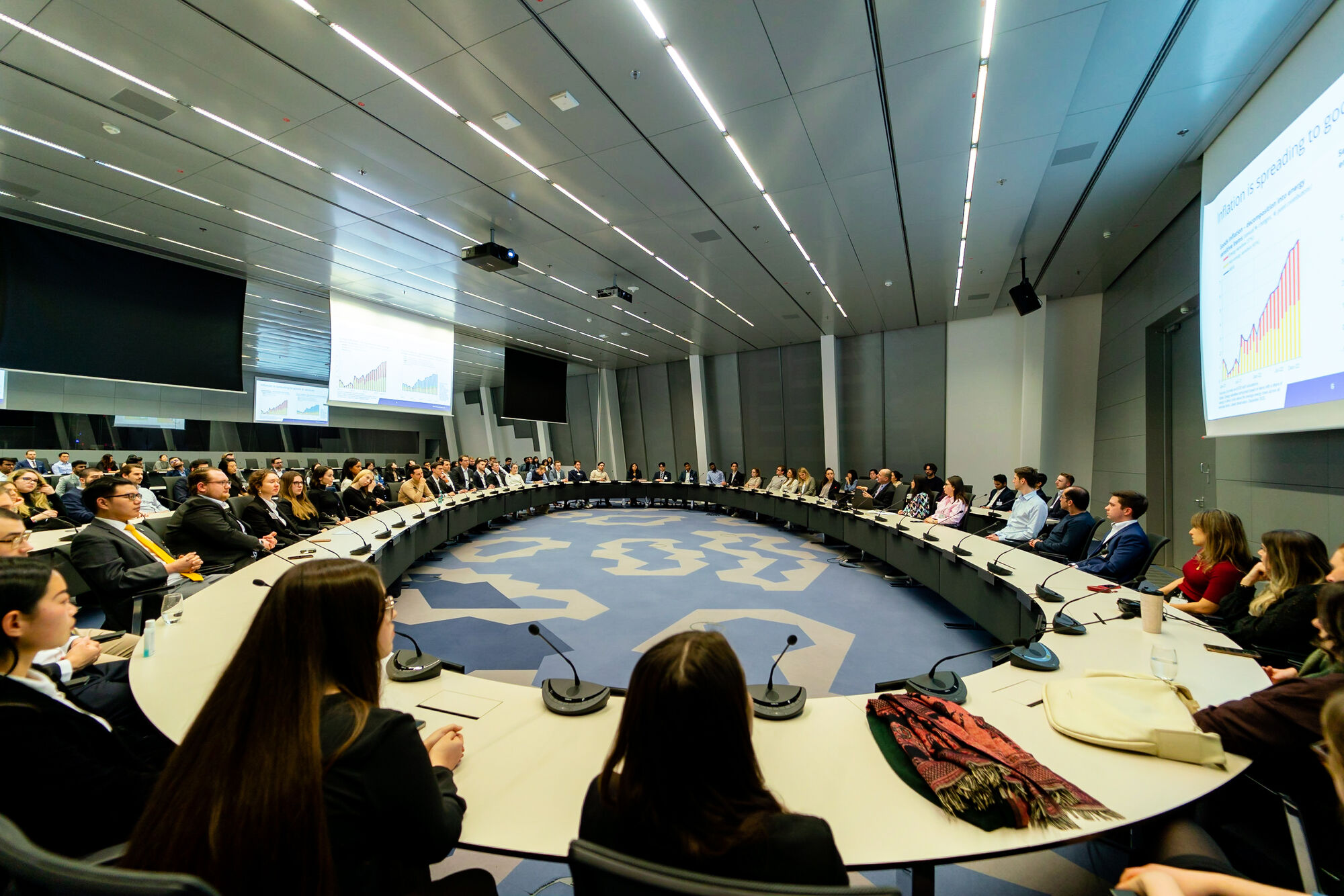European Central Bank (ECB) is an essential European institution which implements monetary policy and manages the euro, the single currency shared by 20 European countries. This vast ever-running policy-making institution with top-notch professionals opened its doors for Frankfurt School’s master students as a part of the Semester Opening Event at ECB. The presentation and Q&A session named “ECB policy in a world of turmoil” was led by Gabriel Glöckler, Principal Communications Adviser at the European Central Bank and Chief editor of the ECB Blog. During the event, I was not only able to capture the atmosphere of the institution but also to receive a vivid overview of today’s economic challenges and the policy leading to the problem resolution. On top of that, I managed to get a small personal conversation with Mr. Glöckler to gather insights on the key soft skills needed for the young specialist to successfully work at the ECB.
When I entered the ECB’s headquarters, I was mesmerised by the breathtakingly large scale of the complex: the centre of the monetary policy decisions of Europe was overwhelming. The feeling of greatness was not purely visual. The principles of the establishment and the integration process of the EU are of the uttermost materiality there: non-discriminatory and uniting space, reminiscent either of an airport or a stock exchange and, all in all, of a decision-making centre.
As a Master in Management student with a journalistic background, I thought of nothing better than to join the coffee break zone before the event and ask several FS students a few questions. The question of the uttermost interest to me was why they decided to register for the ECB semester opening. I addressed that question to the group of students drinking exquisitely dark espresso at the premise of the event. Among the humorous answers like “showing off the suit at last”, they expressed a live interest in professionals’ views on the current economic turmoil Europe is going through and the solutions for a brighter future for the EU.


Semester Opening at European Central Bank
“ECB policy in a world of turmoil” was indeed the title of the presentation and the Q&A session afterwards. Gabriel Glöckler presented a brief albeit detailed overview of the economic situation and listed the key drivers of inflation, among which energy is the most noticeable. The potential recession that might occur because of the recent drop in confidence levels and price surges is likely to be short-lived and shallow, and might indeed be avoided altogether, so there are grounds for careful optimism. The current journey of tightening ECB policy and following a thoughtful approach at every step is aimed at bringing inflation under control not only directly through central bank methods, such as raising interest rates, but also through consistent communication. The institution is also working on how to better cope with the exceptional uncertainty we have been facing: it is an important experience to develop, together with other policy-makers in the EU, ideas and policies for stability and sustainable growth of the European economy.
After I had recorded all the theses of the speech in my orange book while drinking the coffee, the Q&A session started. Frankfurt School students were inquiring about “greening” the ECB’s policy, the risks of politicising the actions of the ECB and the issuance of the digital euro. The speaker patiently answered all the questions, highlighting the integrative and analytical role of the ECB, which requires a thorough examination of the economic situation.
The last part of the event was dedicated to how young specialists may start their careers at ECB. Being an EU institution, as a rule, only EU nationals can work for the ECB. Nevertheless, for the citizens of member countries, there are plenty of opportunities to apply for the job at ECB: a traineeship, including in the ECB’s Banking Supervision wing, the ECB Graduate Programme or a direct job application.
Finally, I took advantage of the networking session after the event by personally thanking Mr. Glöckler for the speech. After a brief introduction of myself and a firm handshake, I asked for a tip on which soft skills are essential to becoming a top-notch specialist at the organisation. According to him, the key skills are the ability to assume the responsibility to seriously contribute to policy-making with the highest quality of analysis and expertise, the ability to keep the mission in mind and the ability to perform in a multicultural and inclusive team.
The great spirit of the bigger mission and numerous insights were at the core of my experience of the visit. However, it was the ECB’s inclusiveness, openness and unflinching commitment to European unity that inspired me for further personal and professional growth: to be thoughtful, open to new knowledge and welcoming of change.